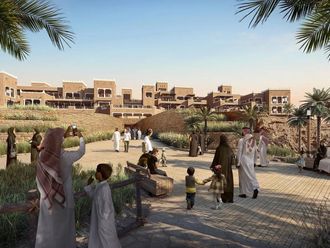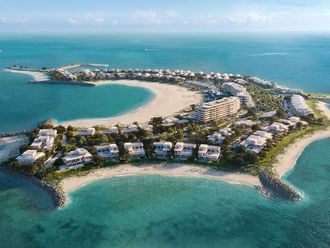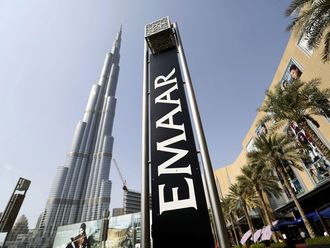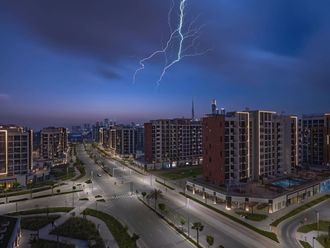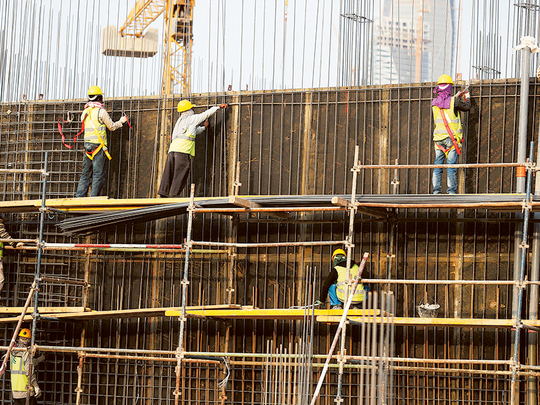
Riyadh: Saudi Arabia’s construction industry faces difficult times ahead as the prospect of state budget cuts adds to painful labour reforms, according to major builder Al-Khodari, in a sign of the strain on an economy squeezed by lower oil prices.
Companies in the sector have benefited from a construction boom over the past decade as the world’s top oil exporter has taken advantage of high crude prices to spend heavily on transport, social infrastructure and industrial facilities.
But prices have more than halved since last summer due to a global supply glut and the volume of building projects looks set to shrink as the government, facing a mammoth budget deficit, starts to economise by slowing or shelving some plans.
Construction firms, including foreign companies operating in the country, have also been hit hard by labour reforms by a government seeking to reduce its reliance on oil, and also avoid the kind of social unrest seen elsewhere in the Arab world.
It has been pushing companies to hire more Saudi citizens instead of cheaper foreign workers, in order to move Saudis out of the state sector and into private industry. It is also keen to keep a lid on an unemployment rate standing at 11.6 per cent.
“I think we should expect the difficult situation in the (construction) sector to go on for 18 more months,” Fawwaz Al Khodari, chief executive of Abdullah Abdul Mohsin al-Khodari Sons, told Reuters in an interview.
“Companies are facing troubles mainly due to the labour reforms. We will see the result of the budget deficit later, but now we are in a situation where the pain is already there.” Brent crude prices have fallen to around $45 a barrel from over $115 in June last year, slashing Saudi Arabia’s oil export cash that traditionally account for around 90 per cent of its state revenues.
The Saudi finance minister said in September that the government was delaying some construction projects but those deemed important for the economy would go ahead. He did not elaborate.
“I believe many projects that are not seen as being essential will be first to be shelved, including those that were tendered but not awarded,” Al Khodari said.
For example, a plan to build soccer stadiums around the country may be seen as non-essential, while projects such as housing, hospitals and schools look likely to go ahead, he said.
Saudi officials could not be reached for comment.
The labour reforms, introduced in 2011, has hit companies’ profits as they compete to hire the limited number of Saudis willing to work in the sector, and also face higher costs obtaining work permits for foreigners.
Another uncertainty facing the sector is whether the government will raise subsidised domestic fuel prices next year to save money. The oil minister said last month that such reforms were being considered.
Khodari said that depending on their size, fuel price hikes could have a considerable impact on companies which operated large fleets of vehicles and equipment, such as his own.
Cautious bidding
Some media reports have speculated that Saudi government bodies are delaying payments to contractors because of worsening cash flow — something the government has not commented on.
However, such delays were common around the Gulf, and Khodari said he did not see a general, oil-related slowdown in payments. “We have always had certain clients that had slow payment processes, even when spending was very high. But since we have other clients that are paying timely, this leads us to believe that it is more an administrative issue within some institutions and therefore cannot generalise.”
However, the uncertain outlook for some projects is making contractors more cautious bidding for them, and many have decided to tender for fewer bids, Al Khodari said. He aims to raise the share of nongovernment contracts at his firm’s business to 35 per cent by 2018 from 15 per cent of the present backlog.
His firm reported a 14.3 million riyal (Dh14 million, $3.8 million) loss for the third quarter against a 15 million riyal profit a year earlier, its first net loss since its 2010 initial public offer.
Revenue fell 17.5 per cent and new contract awards slumped to 31 million riyals from 554.6 million riyals.
Al Khodari said he expected an upward trend in profit margins, which started in 2014, to resume, without being specific on the time frame.
He said his company was well-placed to benefit from the projects prioritised by the state, as some competitors had scaled down their operations in response to the tough environment. He added that building contractors would also be boosted by long-awaited government compensation for a levy imposed on work permits of foreign staff.
He said he expected compensation payments for contractors to start in the first quarter of 2016.
Nevertheless, under present rules compensation can only be obtained after completion of the projects to which workers were assigned, and unless this is changed, companies will face further financial stress, he said.
“I think companies will be extremely lucky if they get anywhere near 60 or 70 per cent (of permit levies paid) with the existing conditions, unless they are changed,” Al Khodari said, adding his firm had paid close to 100 million riyals on the levy to date.


